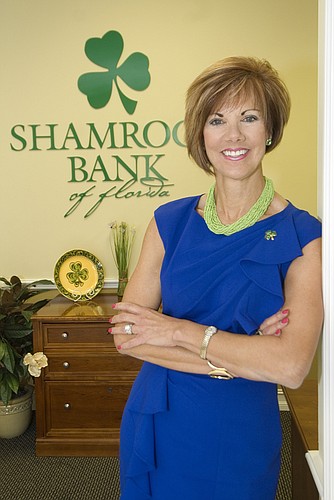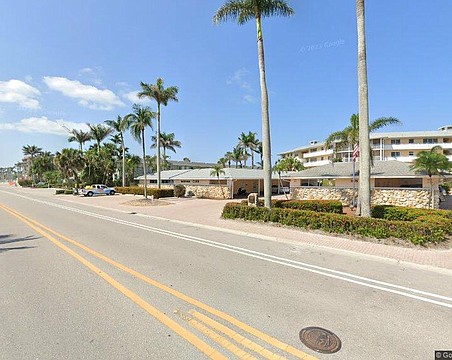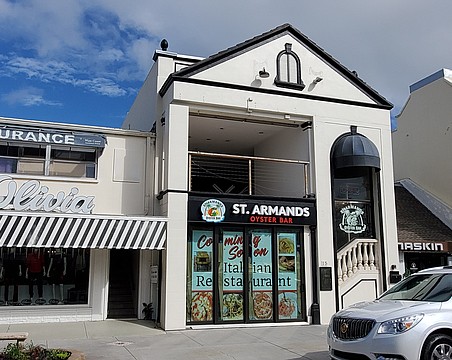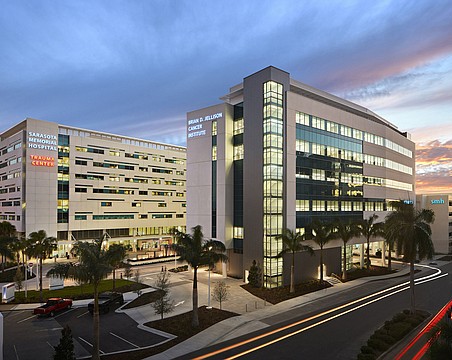Consider the breadth of change in community banks in Collier County.
Just five years ago, there were 13 banks headquartered in Collier County with nearly $7.3 billion in assets. Four of those banks were among the 10 biggest on the Gulf Coast, from Tampa to Naples.
This year, only one Collier-based bank will remain with the same ownership as 2007: tiny Shamrock Bank of Florida with $95 million in assets. The region's biggest banks are now almost exclusively located in the Tampa Bay area.
To be sure, some of Collier's community banks that existed in 2007 didn't disappear altogether, but most lost their local ownership ties. And as some of the biggest ones failed, their assets and deposits were sold to larger banks headquartered outside the area. (First National Bank of the Gulf Coast, another Naples-based community bank, opened in October 2009.)
Community bankers who were at the peak of their influence in Florida banking during the boom, such as Orion Bank CEO Jerry Williams and Florida Community Bank CEO Stephen Price, are now the targets of criminal and civil actions, respectively.
Williams pleaded guilty to conspiracy to commit bank fraud and making false statements to regulators. A federal judge is scheduled to sentence him June 12. Meanwhile, the Federal Deposit Insurance Corp. is suing Price and Florida Community's board of directors for $62 million in damages in connection with that bank's failure.
“We'll probably be the only bank in the Fourth of July parade,” chuckles Colleen Kvetko, the president and CEO of Shamrock Bank. “These financial institutions have always been the fabric of their communities. I know all my customers' names.”
Shamrock is in business today with the same ownership in part because the bank opened its doors in 2007, a late entrant that survived the collapse of Collier County's inflated real estate market.
Expensive real estate
The business of community banking in Florida is real estate, so it's no surprise that Collier banks suffered when the real estate market crashed. House prices in the Naples-Marco Island area fell 50% over the last five years, according to the latest data from the Federal Housing Finance Agency.
“A lesson to be learned is how heavy banks were in real estate,” says Robert Sudbrook, a retired 35-year veteran chief executive in banking. Sudbrook was hired to try to save Partners Bank as its president and CEO.
Unfortunately, Sudbrook says some local banks thought they had diversified their portfolios by lending to different kinds of real estate projects, such as land and condos, or participating in loans tied to real estate in other locations, such as California.
For others, the error was focusing exclusively on real estate construction and development lending in the Naples and Fort Myers areas. “They were all concentrated in these three counties,” says Gary Tice, chairman and CEO of First National. “Not every area of Florida was affected in the same way as Lee, Collier and Charlotte.”
By contrast, only a total of five banks have failed in Hillsborough and Pinellas counties in this cycle, remarkable given the much larger size of that market. “Tampa has a more stable business environment because they have manufacturing and wholesale,” says David Seleski, president and CEO of Stonegate Bank.
Fort Lauderdale-based Stonegate acquired the twin Naples failures of Hillcrest Bank and Partners Bank in October 2009. “I would say initially they didn't meet our expectations,” Seleski says of the two Naples acquisitions. “The economy was so bad we didn't see any real growth until the summer of last year.”
Diversification and growth prospects are two reasons why First National has expanded to the Tampa area, says First National's Tice. “We're also looking at Orlando,” he says.
According to the latest deposit market-share report by the FDIC, total deposits in Collier County fell 10% from the end of June 2010 to just less than $10 billion at the end of June 2011.
New investors step in
To be fair, the assets and deposits of Collier's community banks didn't disappear. They're now controlled by a different group of investors, some of them local but many of them outsiders.
For example, Naples-based Ovation Holdings recently agreed to acquire the three branches, most of the deposits and some of the loans of Royal Palm Bank in Naples. Ovation is the parent company of Encore National Bank, and its investors are Naples and Ohio business executives such as Malachi Mixon, the entrepreneur behind the Dirt Devil vacuum cleaners and chairman of medical-equipment giant Invacare, and Theodore Etzel, the president and CEO of Conditioned Air in Naples.
While the FDIC shows Encore is technically chartered in Port Charlotte, CEO Tom Ray operates out of the community bank's Naples office. Without branches and most of its deposits, Royal Palm Bank will be folded into its current parent company, Mercantile Bancorp of Quincy, Ill., simultaneously with the Ovation transaction, Ray says.
For many investors, the banking collapse in Collier County provided opportunity. Banks such as EverBank of Jacksonville, IberiaBank of Lafayette, La., and Central Bank of Stillwater, Minn., have moved into the market by taking over failed and struggling banks at steep discounts.
The market has seen new banks, such as Mutual of Omaha Bank, the insurance giant's banking arm, that acquired Marco Community Bank on Marco Island. Groups of investors, such as North American Financial Holdings and Bond Street Holdings, formed to capitalize on the community banking industry's misfortune and took over TIB Bank and Florida Community Bank, respectively.
While some believe we've seen the end of the community bank model in Collier and elsewhere, others see it differently. “I deeply believe in community banking,” says Sudbrook. He says staff cutbacks in banking means community banks could hire talented bankers. “It's a great opportunity for them to staff up,” he says.
At Shamrock Bank, Kvetko says she's taking advantage of the fact that her bank is one of the few that can claim local ownership. (Domino's Pizza founder and Naples resident Tom Monaghan is an investor.) The fact that regulators are unlikely to grant charters to new community banks until the crisis has passed means Kvetko has an economic advantage for at least a few years.
“We've got a [loan] pipeline like you can't believe,” she says. “People want to deal with people. You cannot do that at the larger institutions.”
Kvetko says she has a core group of experienced employees and she outsources some of the work to be efficient. “It gets down to the people that you have on the bus all driving in the same direction,” she says.
WHERE DID ALL THE BANKS GO?
Of the 13 community banks headquartered in Collier County in 2007, 12 have changed hands or will be acquired by the end of the year. Here's a snapshot of each ranked by total assets at the end of 2007.
• Orion Bank, Naples (2007 total assets: $2.6 billion): Regulators shut down Orion in November 2009 and sold the assets and deposits to IberiaBank of Lafayette, La. Jerry Williams, Orion Bank's former CEO, pleaded guilty earlier this year to conspiracy to commit bank fraud and making false statements to regulators. A federal judge is scheduled to sentence Williams in Fort Myers June 12.
• TIB Bank, Naples (2007 total assets: $1.4 billion): North American Financial Holdings acquired TIB Bank by agreeing to invest $175 million in the bank in exchange for new shares in parent company TIB Financial, wiping out existing shareholders by stock dilution to just 1% ownership of the company. The deal was completed in fall 2010. NAFH is a group of former Bank of America executives that includes former Chairman Hugh McColl. TIB is now part of newly formed Capital Bank.
• Florida Community Bank, Immokalee (2007 total assets: $933 million): Miami-based Premier American Bank, a subsidiary of Bond Street Holdings, acquired Florida Community Bank in January 2010 from the Federal Deposit Insurance Corp. after regulators seized it. The FDIC is now suing former CEO Stephen Price and the board of directors, alleging negligence and seeking $62 million in damages from the failure.
• Bank of Florida — Southwest, Naples (2007 total assets: $679 million): Bank of Florida — Southwest was one of three bank subsidiaries of Bank of Florida Corp. that regulators shut down in May 2010. The FDIC then sold the assets and deposits to EverBank of Jacksonville.
• First Florida Bank, Naples (2007 total assets: $425 million): Columbus, Ga.-based Synovus acquired Naples-based Banking Corporation of Florida, parent of First Florida Bank in October 2005, but FDIC records show the bank's Naples charter ended in 2008.
• Community Bank of Naples (2007 total assets: $406 million): In 2008, Royal Bank of Canada and subsidiary RBC Centura Banks acquired Alabama National BanCorporation, the parent of Community Bank of Naples. The Birmingham-based holding company acquired Community Bank of Naples in 1998. The bank's Naples charter ended in 2008, according to the FDIC.
• The Royal Palm Bank of Florida, Naples (2007 total assets: $168 million): Ovation Holdings, the parent company of Encore National Bank, is buying the three branches, most of the deposits and a portion of the loans of Royal Palm Bank from Quincy, Ill.-based Mercantile Bancorp. Royal Palm Bank's Naples charter will end after the transaction is concluded later this year.
• Liberty Bank, Naples (2007 total assets: $157 million): Liberty Bancshares Iowa ended the subsidiary bank's Naples charter in 2009 after buying back the Florida bank it had spun off. The company maintains a branch in Naples and Bonita Springs.
• Bank of Naples (2007 total assets: $156 million): SNL Financial recently reported that Minnesota-based Central Bancshares plans to acquire Bank of Naples. The Stillwater, Minn.-based parent of Central Bank acquired Commerce Bank of Southwest Florida in Fort Myers from the FDIC in November 2009 after regulators seized that bank.
• Marco Community Bank, Marco Island (2007 total assets: $146 million): Regulators shut down Marco Community Bank in February 2010 and sold the deposits to Mutual of Omaha Bank.
• Hillcrest Bank, Naples (2007 total assets: $106 million): Regulators shut down Hillcrest Bank in October 2009 and sold the deposits and some of the assets to Fort Lauderdale-based Stonegate Bank.
• Partners Bank, Naples (2007 total assets: $56 million): Regulators shut down Partners Bank in October 2009 and sold the deposits and some of the assets to Stonegate Bank of Fort Lauderdale. Partners Bank was the 100th bank to fail in the current cycle in the U.S.






